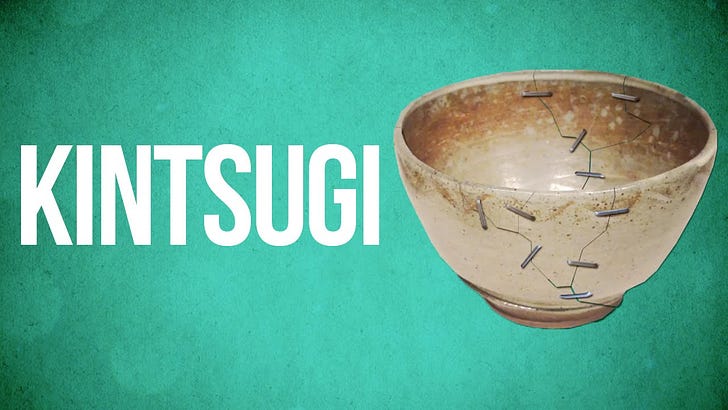The biggest change in my life in the last eight years since FF is letting go of “self-improvement.” In my 30s, I spent a lot of time in the self-help and healing section of the library. I read a lot of positive psychology during that time.
Now, post FF, or maybe simply getting older, I’ve let a lot of that go. I’m less interested in “improving” my “self.”
In Japanese, the word kintsukuroi or kintsugi literally means “golden repair.” It refers to the practice of fixing cracked pottery with lacquer that's blended with actual gold or silver.
Metaphorically, it suggests that something may become more beautiful and valuable after being broken. The wounds and the healing of the wounds are integral parts of the story, not shameful distortions to be disguised or hidden.
We spend a lot of time in the first half of our lives disguising or hiding our brokenness. In the second half of our lives, we start letting that go. We can’t help but to start to let our cracks show. We finally realize our displays of perfectionism are too unrealistic and too exhausting to keep up.
Wholeness does not mean perfection. It means embracing brokenness as an integral part of life. — Parker Palmer
Rumi said your task is not to seek love, but merely to seek and find all the barriers within yourself that you have built against it, and embrace them. Of course, the most difficult part is embracing them, those parts of ourselves we want to hide or refuse to even fully acknowledge. But if we can embrace our shadows, we can fully embrace the Ten Thousand Things, which is the Taoists’ and Buddhists’ name for Everything. Until we can embrace the cracks, we are still sorting life into piles of laundry: I want this, but not that. And the cost is living at arms-length, always slightly distant from what Richard Rohr describes as the Universal Christ, his “another name for Everything.”
The gold is in the cracks. When you can love the cracks in yourself, you can love everything.
When we love the Ten Thousand Things, the Universal Christ, in ourselves, we don’t have to spend our time and energy achieving, consuming, and displaying our taste and individualism. We don’t have to waste our lives showing how different we are from people we don’t like or are afraid of becoming. For me: the homeless person, the dying person, the addicted person, the unattractive person, the conservative person… the list goes on endlessly. In me, in all of us, so much resistance to the Other, to what Mother Teresa called “Christ in his most distressing disguises.”
There is no Other. The hole in me is the hole in you.
Here’s the secret: when we stop resisting that which we dislike, we have ultimate freedom.
But we have to surrender. We have to surrender trying to prove we’re better than everything we dislike in ourselves, and in others. We have to let go of “better,” let go of grabbing more than your share, let go of the “self-improvement.” Grace, like the rain, falls on everyone.
“When I first met you I felt a kind of contradiction in you. You're seeking something, but at the same time running away for all you're worth.”― Haruki Murakami, Kafka on the Shore
All this time, running from all your worth: the cracks, the gold, one and the same. Love, another name for Everything.
There is something in you that may become more beautiful and valuable after being broken. In everyone else too. There is a crack in everything, that’s how the light gets in.1 Enoughness. Grace. You are coming home.
Love After Love
The time will come
when, with elation
you will greet yourself arriving
at your own door, in your own mirror
and each will smile at the other's welcome,
and say, sit here. Eat.
You will love again the stranger who was your self.
Give wine. Give bread. Give back your heart
to itself, to the stranger who has loved you
all your life, whom you ignored
for another, who knows you by heart.
Take down the love letters from the bookshelf,
the photographs, the desperate notes,
peel your own image from the mirror.
Sit. Feast on your life.
— Derek Walcott




Doug, Enjoyed reading your post today. Thank you for channeling wisdom of wonderful sages and your own discoveries. This is very apt for those in 'retirement' or 'going inward' stage of life. Reminded me of my recent learning from JK (Shri Jiddu Krishnamurti). All the seeking is an activity of the 'self' only way stop the incessant activity is to 'watch the self and its indulgences' without judgement without any conclusion or end. A seeker has an inherent disadvantage from the knowledge collected. It is always stale! Recently I understood all the knowledge we accumulate, creates blocks/spots on the ultimate reality causing it (the truth) to be obscured.